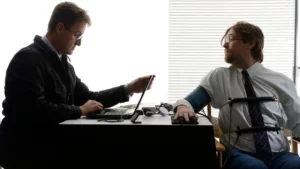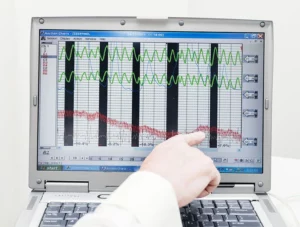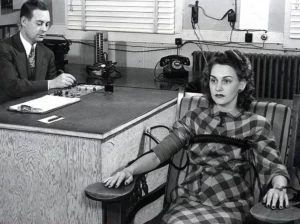When searching for a polygraph examiner, credibility and expertise are key. You want someone qualified to conduct an accurate, fair test. However, with no licensing requirements for polygraphers in most states, it can be hard to discern the truly reputable ones. By doing your due diligence and knowing which qualities to prioritize, you can find a steadfast examiner you can rely on.
Research Their Background Thoroughly

The first step is to investigate their professional background. Polygraphers often have experience in law enforcement or government agencies. Look for:
- Formal training – Many obtain degrees related to psychology, physiology, or forensics. They should have graduated from an accredited polygraph school. The American Polygraph Association (APA) accredits programs like the Backster School of Lie Detection.
- Certifications – Examples include the APA’s Professional Certified Polygraphist credential, or state-issued licenses in the few states requiring them, like New Mexico or Florida.
- Work history – Those with background in public service, the judicial system, or large corporations likely have solid experience. Verify they list specific employers rather than vague claims of “government experience.”
- Association memberships – Membership in the APA and state polygraph associations indicate dedication to the field.
- Ongoing education – The practice is always advancing, so confirm they complete continuing education yearly.
Look for Signs of Integrity and Impartiality
The examiner’s integrity directly impacts the test’s accuracy. Seek those committed to honest, unbiased procedure.
- A clean record – Obviously, confirm no criminal history or ethical violations are on record. Search the APA site for disciplinary actions.
- Adherence to standards – Their policies and practices should comply with APA protocols. This includes maintaining your confidentiality.
- No vested interest – Avoid examiners paid per your “failure.” Opt for flat fees upfront instead.
- Referral-based – Dependable examiners develop solid professional referrals over time. This evidences integrity.
- Session recording – Many allow you to record the session to enhance transparency. The truly principled will encourage it.
Validate Their Skill Level and Abilities

You want an examiner adept in polygraph techniques and test analysis. Look for:
- Years of experience – They should have five-plus years of active field work under their belt. Experience levels can vary though.
- Technique versatility – Make sure they utilize multiple approaches like the Backster, Reid, and Federal Zone Comparison Tests based on the circumstance.
- Specialized experience – See if they have niche experience like sex offender or employee screening tests matching your need.
- Questioning skill – Their real-time questioning and interrogation tactics should be top-notch. Review sample questions in advance if possible.
- Analytical expertise – Ensure they use proven methods for analyzing the polygraph readings and deriving conclusions. Don’t hesitate to ask questions here to assess their competency.
Confirm Availability and Logistics
As a final step, validate scheduling availability and all logistical details:
- Ideal location – If they have an easily accessible office, that’s preferable. Or confirm they can bring equipment on-site to your home or workplace.
- Scheduling flexibility – Choose examiners able to accommodate your schedule needs, or those open to off-hours appointments.
- Mobile capacity – Ensure they have all necessary equipment that is calibrated and well-maintained for on-location testing.
- Presentable – They should convey professionalism in manner and appearance. You want someone who will represent your needs appropriately.
- Cost – Get quotes from multiple examiners and clarify what’s included. Watch for hidden fees.
By thoroughly vetting polygraphers based on experience, integrity, capabilities, and logistics, you can find the most ideal, trustworthy partner to conduct your examination. Don’t settle on the first option you find – do your homework to get the right fit.
Why It’s Critical to Find a Reputable Examiner

You’re placing your trust in the examiner to conduct an impartial, accurate procedure. Having the wrong one can spell disaster through:
- Inaccurate results
- Unprofessional conduct
- Biased or manipulated outcomes
- Breaches of confidentiality
- Legal risks
Shoddy examiners also unjustly tarnish the reputation of the profession as a whole. The key is distinguishing quality operators from the inept or unscrupulous ones.
Warning Signs of an Untrustworthy Examiner
While most polygraphers maintain high ethical standards, beware of these red flags:
- Claims of 100% accuracy – No test is infallible. Reasonable examiners cite 92-95% accuracy rates.
- Rushing you to proceed – Proper examiners will invest substantial time in preparation.
- Refusal to explain processes – They should readily explain all methods and technology. Lack of transparency is suspicious.
- Use of outdated equipment – Insist on computers and sensors that are properly maintained and calibrated.
- No professional affiliations – Lack of accountability through professional associations is concerning.
- Unclear pricing – Fees should be disclosed upfront, not masked or tacked on later.
- Bad online reviews – Multiple negative reviews likely signal significant issues to avoid.
By trusting your gut and watchfully avoiding warning signs, you can steer clear of unqualified examiners.
Questions to Ask Prospective Polygraph Examiners

When interviewing polygrapher candidates, asking the right questions is key to discerning who you can depend on.
Here are crucial questions to ask:
- What is your base of experience in administering polygraph tests?
- What education, certifications, and training do you possess?
- What is your methodology and technology for measuring responses?
- Do you follow standard APA protocols?
- What types of post-test analysis do you use?
- How long are typical examinations and how many questions do you ask?
- Do you have experience with my specific type of test purpose?
- What safeguards do you employ for maintaining examinee rights and confidentiality?
- May I record our session?
- What mandated reporting laws could come into play?
- How much do you charge and what payment methods do you accept?
- Can you provide references from past clients?
The examiner’s responses will prove if they have the right expertise, integrity, and professionalism to conduct your test. Don’t hesitate to press for details and clarify any unclear or concerning answers.
Resources for Finding Polygraph Examiners
Here are some reputable resources to utilize when searching for a qualified polygraph examiner in your region:
- American Polygraph Association (APA) – Use the APA’s online member directory to find certified examiners by geographic location.
- State polygraph associations – Many states have their own associations you can check for local listings.
- State licensing boards – If your state issues polygraph licenses, check with the licensing board for a list of approved examiners.
- Police or law contacts – Those in law enforcement may have referrals to share based on examiners they trust.
- Online reviews – Check Google and Yelp listings, focusing on providers with consistently favorable feedback.
- Personal referrals – Ask contacts like your attorney or healthcare providers for any recommendations.
By tapping into the right resources, you can surface vetted options without having to start a search from scratch. Still do your own careful evaluation before ultimately choosing where to place your confidence.
Final Tips for a Successful Polygraph Experience

Once you select an examiner using the guidance provided, keep these last tips in mind:
- Be candid upfront about any medical conditions or medications that could influence results.
- Follow all pre-test instructions provided around sleep, diet, and other factors.
- Never take countermeasures to try to manipulate results. That’s unethical and easily detectable.
- Understand your legal rights related to consent, confidentiality, and more based on your purpose.
- Maintain composure during the exam. Reactions you can’t control will be accounted for.
- Know polygraphs aren’t definitive conclusions. But quality examiners interpret results responsibly.
Finding a meticulous, principled polygraph examiner to conduct your examination is well worth the effort. Do your due diligence, ask the right questions, and use trusted resources to secure the best expert for your important test.

